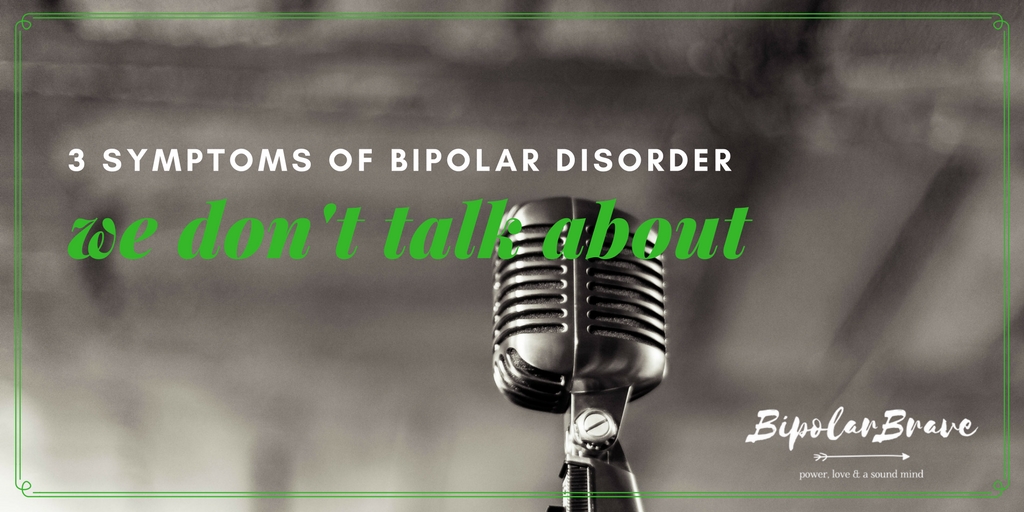It occurs to me the mental illness/mental health conversations these days are covering quite a bit of ground. I think we’re taking off in that department – we’ve been talking it up nationally and internationally – mental health matters. But I’ve not really seen a lot of the bipolar disorder conversations about the following three symptoms of the disorder.
- Hyper-religiosity. Having experienced it first hand, it is something I gravitated to in my illness, manifesting quickly from reading a passage of Scripture to believing the Scripture was talking about me, literally. From thinking God was speaking to me, to thinking I was sent on a mission to do something, to thinking I was actually apostle Paul or Peter, this is a sensitive but real issue for me when I’m in an episode. When my bipolar was at its worst, I believed I was characters from the Bible, because it spoke so strongly to me. I don’t understand the fascination with the Bible and becoming characters in it, but I imagine anywhere you have a little mix of hyper-religiosity and psychosis in a manic stage, it’s easy to get a boat-load of narcissistic tendencies and end-times hysterics. As a Christian, this was especially difficult because my relationship with God and His son Jesus is rooted in my reading of His word. This is complicated by the disorder, and I will give the analogy of a fun house mirror. In a carnival fun house, the mirrors will play tricks on your reflection, exaggerating your proportions. With bipolar, it was an exaggerated look at Scripture, seeing myself in the mirror but in a distorted fashion.
- Hyper-sexuality. I had symptoms that led me down a slippery slope of hyper-sexuality. Being manic and having hyper-sexual tendencies led to a dangerous game of cat and mouse with sin. This stuff is real, and it’s dangerous. Just like disease is a result of sin and the fall, this trait of bipolar is a result of the sin-nature and flesh we remain in, so long as we’re humans. When I finally got on the right dosage of medications and stabilized, I was able to see a lot of this symptoms’ grasp release. There is such thing as stronger libido in mania and it was a conscious effort to stay pure and a struggle to not feel tempted. Just like Scripture says, “Flee sexual immorality.” While I am married and have a husband to pursue my sexuality with, I tended to be away from him in the hospital, thus setting myself up to fail. This is not good, nor for my husband to be without me if I’m sick. If Satan’s workshop is idle hands/minds, his work is sexual immorality and lust. By the grace of God, I don’t struggle with this symptom anymore.
- Psychosis. There may be more talk about psychosis in schizophrenia than bipolar, I’m not really sure. Something I was frequently subject to though was psychosis – lucky me. And when I say psychosis I mean in the form of hallucinations, voices, delusions, grandiose thoughts, ideas of reference, paranoia, and hyper-religiosity… I think I covered most of it. This is the madness in bipolar, and where inferences were made because of the most subtle signals my brain was sending to my consciousness. If you’ve ever seen the movie about John Nash, A Beautiful Mind, his brain is interpreting events and causing him to believe things are subliminal messages meant specifically for him to be a part of. That’s the delusions. Hallucinations are hearing or seeing things that aren’t really there, but perceived. I hallucinated and heard voices at 16, saw visions at 24, and as a Christian, I know there’s a form of spiritual warfare mixed into this. Basically, psychotropic medication and drugs can be an open door into those things, but I digress as that is for another blog post. Psychosis, in its truest form, is a state of confusion, and a scary place to be. It’s also complicated, so parascience and spiritual warfare-type explanations aren’t hard enough evidence to explain the nature of this part of bipolar. I do know that on my current medication I have not had any psychosis and for that I praise God.
These three symptoms are difficult to go through, and just as difficult to understand fully. I’m sure with science and technology, medicine and advancements in these arenas, we will one day be able to have more solid explanations, but today we only have observation by the naked eye (in some cases research on brain activity through more advanced testing – ie. MRIs, etc.) and the experiences we bipolars have in remembering/reporting on what it’s like to be hyper-religious, hyper-sexual and psychotic. It is my hope that this field is further studied so that we can understand this disorder better to better counter its effects.

What do you think?